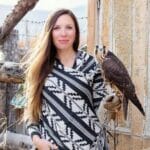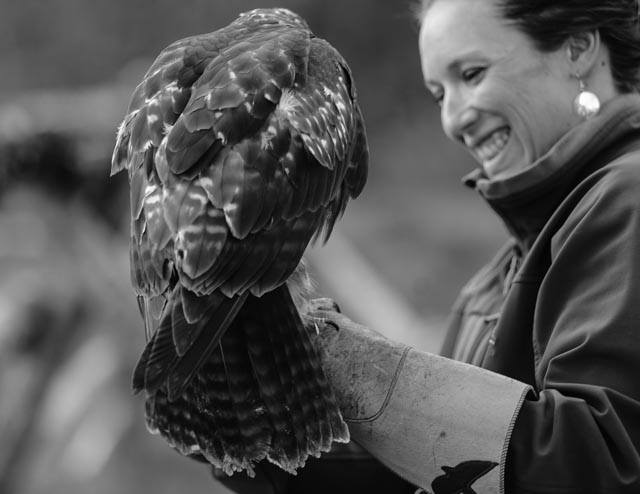By Shauna Stephenson
Before Lolo there was Olly the redtail hawk. And before Olly, FedEx brought me a box of rats, frozen, labeled and neatly arranged in Ziplock baggies, ready to be stacked alongside the Otter Pops and frozen peas.
“If you’re going to be a falconer, you’re going to have to be ok with gross things,” said Scott. Scott is my sponsor and mentor – a requirement for new falconers. After being certified, each apprentice falconer must hunt for two years under the guidance of a more experienced falconer.
“Things like guts on your floor or a hawk eating the face off a cute bunny rabbit.” He sucked the air in between the gap of his bottom teeth. “Nature ain’t always kind. And it ain’t always pretty.”
Scott likes to put things in stark perspective sometimes. He’s blunt. A deep Southerner by birth, but wanderer by nature. He knows his trade well. As a master falconer he has trained dozens of birds – kestrels, Coopers hawks, Harris hawks, goshawks, golden eagles. He has made a life of taking problem birds from other falconers whose nerves have worn thin. His chin still bears the scar from the talons of a golden eagle who grabbed his face one day, boring its forceful talons into his lower jaw before he could swat it away.
Now in neighboring states, we talk regularly, working through problems or giving general updates on progress with our respective birds.
It was Scott who first supported my desire to be a falconer and it was he who introduced me to the practice. Tradition runs deep in falconry and technique has been passed from master to apprentice for hundreds of years. Today is no different.
Our conversations usually drift between human and beast and I spend full minutes listening as he chats with the deer in his yard, greets the dog or chides the cat, sometimes wondering if he’s still with me or has set the phone down and wandered off for a more meaningful conversation with the squirrel at the feeder.
“Watch now… Ol’ Maggie is going to grab your butt if you don’t leave her alone,” he’ll say as the cat wanders too close to the eagle. And then he’s on to the next topic, his theory on mule deer management, where higher education institutions went wrong in the 60s or why cardiologists make terrible car wash managers.
He’s smart—probably too smart—and the kind of guy I’d want on my team if the zombie apocalypse ever came. He’s the kind that’s probably already prepared.
There aren’t many who grow up dreaming of becoming falconer. I’m not sure if Scott did. From what I can surmise, his was a story of a wild youth. Now at nearly 70, he prefers a calmer lifestyle in the windswept sagebrush of Wyoming with his lovely wife, their cats, a sweet little pup, Callie, a goshawk he calls “Baby Girl” and an eagle named Maggie.
Those who find falconry tend to find it through other gateway drugs: fishing, big game hunting, upland game. They’re usually conservationists and may start as bird watchers or biologists or trapped office assistants who just need to blow off some steam and do something different. Most are more loners than social. Most are more weird than not. And that’s OK.
The few I know are hunters and conservationists at heart and need the feel of the wild to get through their day. I suppose when you weigh it out, there’s an element to each hunter’s soul that needs to tip more to the wild every now and then. For most, that may only be for a few days per year. Finding that balance where one can blend back into the fabric of the natural world is what keeps many of us more sane than not.
When I think about how I came to falconry and why there’s a bird perched on my dining room table, I think about those conversations I have with Scott where I am witnessing his life as though I were listening in from an open window. There’s a noticeable change when he’s chatting up the dog or the bird and it’s a conversation that sounds more natural to him. Not edgy or constrained like when he talks to humans.
It softer, lilting almost, and seems to be where he is most at ease. As his attention turns to the sparrows or the antelope or the cottontails in the yard, I laugh and say to myself that I suppose it takes all kinds. There are sportsmen who prefer visiting the wild and there are some who feel more comfortable inviting it into their home, offering it a bite of rat or a bit of quail and then pulling up a chair for a visit by the fire.
“Well, go feed your family,” he’ll say and hanging up the phone I’ll think “falconers are such a funny bunch.”
And then I head back through the dining room, chiding the cat as I go to stay away from the bird and head toward the little voice yelling in my kitchen reminding her that the popsicles are behind the rats in the freezer.
Shauna Stephenson is the national communications director and lives in Montana. Keep an eye out for future installments in this series.



